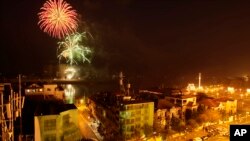Tens of thousands of mourners gathered in Cambodia's capital Monday for the cremation of former king Norodom Sihanouk, a much revered figure widely seen as the father of Cambodia’s independence.
The former monarch's embalmed body had been lying in state since he died of heart failure at the age of 89 in Beijing on October 15.
After sunset, Sihanouk's widow Queen Monineath and his son, King Norodom Sihamoni, wept as they lit a pyre inside a temple-like crematorium built just for the occasion at a site near the Royal Palace.
Artillery salutes and fireworks shook the crowds that gathered on the streets of Phnom Penh. After the cremation, Sihamoni handed out gifts to some 400 prisoners freed in an amnesty as part of the mourning period for his father.
Official guests included French Prime Minister Jean-Marc Ayrault, Japan's Prince Akishino and several Southeast Asian leaders, who bowed in respect in front of the gilded casket.
The elaborate, mainly Buddhist funeral proceedings began last week. An urn containing Sihanouk's ashes will be placed inside the palace grounds.
Norodom Sihanouk secured Cambodia's independence from former colonial power France in 1953 but was unable to prevent his country from being dragged into the Vietnam War.
He ruled both as monarch and head of state until ousted in a U.S.-backed coup in 1970.
A charismatic figure, King Sihanouk later made an ill-fated alliance with the Khmer Rouge, who would hold him and his wife prisoner in his palace during their brutal ultra-Maoist rule. Five of his children died during the 1975-1979 Khmer Rouge reign of terror.
As peace returned to Cambodia following a U.N.-brokered shift to a fragile democracy, Sihanouk retook the throne in 1993, but his power and influence had decreased significantly.
In 2004, he stepped down for a second time, frustrated at the limitations of being a constitutional monarch. King Sihanouk spent his final years in China, where he was treated for a number of ailments.
The former monarch's embalmed body had been lying in state since he died of heart failure at the age of 89 in Beijing on October 15.
After sunset, Sihanouk's widow Queen Monineath and his son, King Norodom Sihamoni, wept as they lit a pyre inside a temple-like crematorium built just for the occasion at a site near the Royal Palace.
Artillery salutes and fireworks shook the crowds that gathered on the streets of Phnom Penh. After the cremation, Sihamoni handed out gifts to some 400 prisoners freed in an amnesty as part of the mourning period for his father.
Official guests included French Prime Minister Jean-Marc Ayrault, Japan's Prince Akishino and several Southeast Asian leaders, who bowed in respect in front of the gilded casket.
The elaborate, mainly Buddhist funeral proceedings began last week. An urn containing Sihanouk's ashes will be placed inside the palace grounds.
Norodom Sihanouk secured Cambodia's independence from former colonial power France in 1953 but was unable to prevent his country from being dragged into the Vietnam War.
He ruled both as monarch and head of state until ousted in a U.S.-backed coup in 1970.
A charismatic figure, King Sihanouk later made an ill-fated alliance with the Khmer Rouge, who would hold him and his wife prisoner in his palace during their brutal ultra-Maoist rule. Five of his children died during the 1975-1979 Khmer Rouge reign of terror.
As peace returned to Cambodia following a U.N.-brokered shift to a fragile democracy, Sihanouk retook the throne in 1993, but his power and influence had decreased significantly.
In 2004, he stepped down for a second time, frustrated at the limitations of being a constitutional monarch. King Sihanouk spent his final years in China, where he was treated for a number of ailments.






